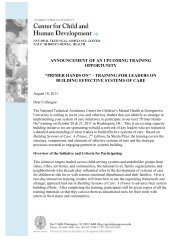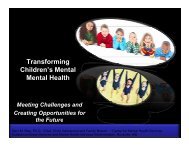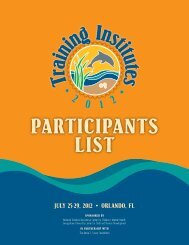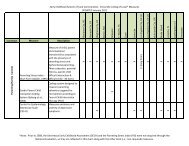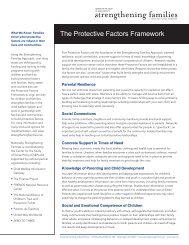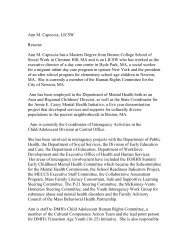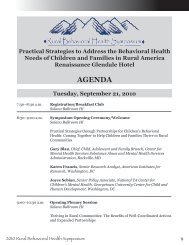Training Institutes 2012 - National Technical Assistance Center for ...
Training Institutes 2012 - National Technical Assistance Center for ...
Training Institutes 2012 - National Technical Assistance Center for ...
Create successful ePaper yourself
Turn your PDF publications into a flip-book with our unique Google optimized e-Paper software.
Specific topics to be covered include:<br />
• How YSPs as staff contribute to better outcomes in systems of care<br />
• The need <strong>for</strong> intensive coaching and mentoring <strong>for</strong> YSPs<br />
• Recruitment strategies including Craig’s List, Facebook, and other unconventional ways to recruit YSPs<br />
• Lessons learned and issues <strong>for</strong> replication when using young adults with lived experience in the staff role of YSP<br />
The faculty team will include the perspectives of current or <strong>for</strong>mer YSPs and a YSP coach. Some of the ideas about<br />
YSPs that they will convey are expressed below.<br />
“When I first started out as a YSP I was shocked and amazed that the professionals started to take a vested interested in<br />
what the youth had to say. It was like someone hit the ‘easy button’ and magically people started to listen. The High-<br />
Fidelity Wraparound process was a no-brainer when I first heard about it. There was a YSP to work with the youth and a<br />
Family Support Provider to work with the parent/guardian. The first word that came to my mind was—GENIUS!!!! I<br />
wish this was around when I was younger!”<br />
“I look at my experiences—the good, bad and ugly—to motivate me to help the youth I work with, to get them through<br />
the bad and the ugly faster than what I went through so they can live in the good. With all the jobs I’ve had and all the<br />
people I have talked to I don’t know of any job more fulfilling then this one.”<br />
“For the youth that I have worked with I was able to give them tips and share my experience of how things were <strong>for</strong> me as<br />
I was growing up. The idea of the YSP is not to change how the youth live but to put hope into how they live. Today I am<br />
a supervisor <strong>for</strong> the unit and can now share what I have learned with staff in hopes that the staff will use it out in the field.”<br />
MODERATOR/PRESENTER: Aaron Thomas, Youth Support Partner Supervisor/Coach, Allegheny County<br />
Department of Human Services, Pittsburgh, PA<br />
Markese Long, M.A.O.L., Youth Support Partner Supervisor/Coach, Diversified Care Management, Allegheny County<br />
Department of Human Services, Pittsburgh, PA<br />
Chad Owens, Youth Support Partner, High Fidelity Family Teams, Child and Family Focus, Hatboro, PA<br />
RESOURCE PERSON: Kenneth Nash, M.D, Western Psychiatric <strong>Institutes</strong> and Clinic, Chief of Clinical Services,<br />
Pittsburgh, PA<br />
WORKSHOP #6 1:30 PM THURSDAY • 10:30 AM SATURDAY • DESTIN 1-2<br />
How to Implement Cross-System Behavioral Support Services in High-Need Schools<br />
OBJECTIVES—Participants will learn:<br />
1. How to identify appropriate schools with a student population that will benefit from behavioral support services in<br />
schools<br />
2. To describe concrete steps <strong>for</strong> program design and implementation<br />
3. To identify potential challenges and solutions <strong>for</strong> engaging key stakeholders and obtaining buy-in<br />
4. To specify the key components of establishing successful communication within a school-based program<br />
5. To employ methods <strong>for</strong> identifying and tracking process and outcome measures<br />
This Workshop will focus on the process, challenges, and lessons learned through the planning and implementation of a<br />
replicable model <strong>for</strong> collaborative service delivery designed to improve educational and behavioral health outcomes <strong>for</strong><br />
children in high need districts/schools.<br />
The strategies to be highlighted are based on the work of the New York Promise Zones <strong>for</strong> Urban Education (Promise<br />
Zones), that is an action strategy designed to achieve New York State’s goals of student engagement, academic<br />
achievement, dropout prevention, social and emotional competence, and positive school culture and school safety. The<br />
overarching goal of the Promise Zone initiative is that children are on task and ready to learn in high-need, high-poverty<br />
schools leading to reduced absenteeism, truancy, and incidents; increased instructional time; and improved educational<br />
outcomes. The initiative <strong>for</strong>malizes partnerships between local school districts and child-serving state and local<br />
<strong>Training</strong> <strong>Institutes</strong> <strong>2012</strong><br />
WORKSHOPS<br />
67



